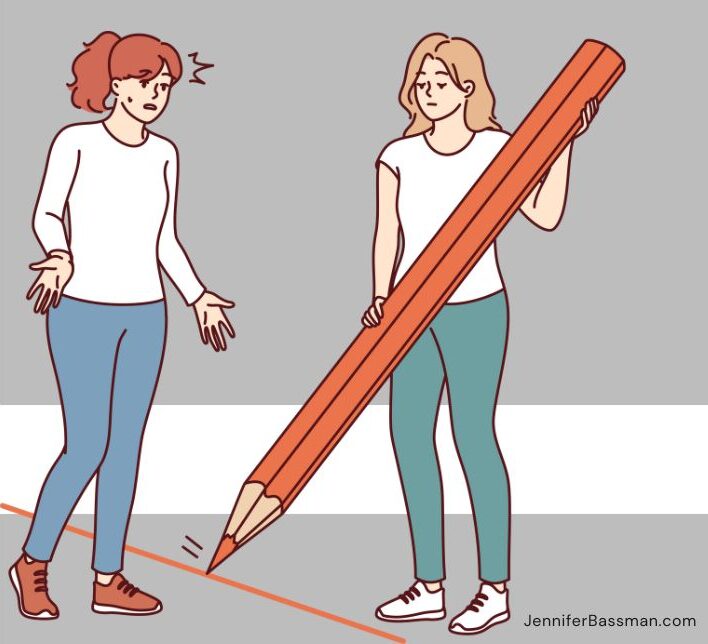If I’m being honest, I would love to blame other people for everything that bothers me or my mistakes.
Late for a meeting? It’s all the slow, stupid drivers getting in my way. (It couldn’t possibly be that I didn’t allow myself enough travel time.)
Leave a task until the last minute? If everyone would quit bothering me so I can focus… (Definitely not my tendency to procrastinate when I don’t want to do something.)
Forgot to put gas in my car? The station was too busy when I wanted to stop. (I straight up didn’t feeling like stopping to do it.)
Now, if I’m being really honest, I used to blame everyone for everything.
As part of my accountability journey it was a surprise to learn that blaming others for my own mistakes, procrastination, and shortcomings was a sign I had poor boundaries.
Like me, most people think they know what boundaries look like: people-pleasing, saying “yes” when you mean “no,” and letting others walk all over you. But there are sneaky, lesser-known signs that your boundaries might be more wobbly than you think.
Most Important Reason for Boundaries That is Rarely Discussed
The rarely discussed, possibly most important reason for boundaries: You have done the hard work to identify who you are and what you want, so that you spend your precious time pursuing your own dreams and goals.
If you don’t know who you are or what you want, you will likely find yourself pursuing other people’s dreams and goals. This leads to several other problems:
- Feeling unfulfilled and unhappy
- Frustration or resentment
- A lot of wasted time
(I hadn’t thought of boundaries that way, either.)
It’s easy to come up with excuses to excuse poor boundaries or not have any at all. You don’t want to upset people, you don’t want to seem disagreeable, or you worry that people won’t like you. Ironically, nearly all of the excuses we come up with to avoid creating boundaries are the very reason we need them.
9 Uncommon Signs of Poor Boundaries
What other behaviors or beliefs may show poor boundaries or even a lack of them?
- Your relationships tend to be difficult or dramatic.
If drama follows you like a shadow, it could be because your boundaries are shaky. Relationships thrive when there’s clarity, mutual respect, and healthy limits. Without those? Cue the soap opera vibes.
- Decision-making feels impossible — or you avoid it altogether.
When someone asks what you want, do you freeze? Go blank? Panic? This could mean you’re out of touch with your desires or too accustomed to deferring to others. The result? You avoid decisions, end up following someone else’s lead, and lose a sense of yourself in the process.
- You’re perpetually exhausted — and not for any obvious reason.
Always prioritizing what others want while ignoring your own needs means you cram your life into the leftover scraps of time. Over the long haul, this breeds fatigue — not just physical, but emotional. Even bigger? When you ignore your own dreams, it drains you in ways you might not even notice. (Cue your frustration or even resentment.)
- Your radar for sharing is all over the place.
Do you overshare private details with people you barely know? Or shut down completely when someone close to you wants to connect? Both can point to boundary issues. Oversharing leaves you vulnerable to manipulation, while withholding might signal discomfort with true intimacy.
- You always feel like the victim.
If you don’t advocate for yourself — say what you need, set limits — it’s easy to feel overlooked or ignored. Over time, this can make you feel like life is out to get you or that others are constantly to blame. But often, the real culprit is a lack of boundaries.
- You’re low-key annoyed… all the time.
When you let others push your limits (or flat-out ignore your needs), resentment builds. And guess what? That simmering annoyance? It’s your inner voice screaming, “This isn’t okay!”
- You secretly think people don’t respect you.
When you don’t set boundaries, others don’t know what your expectations are — or they might think they can act however they please. This leaves you feeling disrespected, even though you haven’t told anyone how to earn your respect in the first place.
- You have no clue who you really are.
Boundaries reflect your values, priorities, and goals. Without them, you’re adrift. You might feel unfulfilled or even purposeless because there’s no clear sense of you.
- You’re passive-aggressive.
Here’s how it goes: You let people take advantage of you, then bottle up the resentment. Instead of addressing the problem directly, you vent it through nagging, sarcasm, or subtle digs. (Calling myself out here…)
The Boundary Creation Method to Fix Poor Boundaries
Identify with one or a few things on this list? Welcome to being human!
Boundaries don’t come naturally to most people. Speaking up for yourself, telling others what you need or want, or making a decision has likely caused some negative reactions in the past. So, it’s not surprising that you might be hesitant to do it again.
What I have learned over time is that the people who are most aggravated or disturbed by my boundaries are the people who benefitted the most from me not having any. No one is entitled to your time and energy.
In my book, Stop Being a Doormat, I share my foolproof 5 step method (The Boundary Creation Method) for creating boundaries and easier ways to enforce them. I created this after my own struggle with boundaries.
- ACKNOWLEDGING -The first step – though it may seem obvious – is acknowledging that you need boundaries. However, many people don’t think they need them or understand why they would be helpful.
- DEFINING – Defining and understanding what boundaries actually are will go a long way toward creating boundaries that you are comfortable enforcing. Also, you need to spend time considering what parts of your life need boundaries.
- CREATING – Creating boundaries involves deciding the thing that needs to change or be protected, figuring out how you want it to change, how to communicate your boundary, and a plan to enforce your boundary.
- COMMUNICATING – Other people can’t read your mind, so you need to communicate your boundary clearly, concisely, and confidently.
- ENFORCING – A major part of enforcing your boundaries, is practicing them before you actually use them. Practice will make them feel more natural and make you feel more comfortable when you need to communicate and enforce them.
Boundaries = Freedom
Boundaries give you freedom. Freedom to pursue what matters to you. Freedom from playing by other people’s rules and working toward their goals. Freedom to build relationships that make you feel valued and respected.
The truth is, boundaries are less about pushing people away and more about protecting the things that make your life meaningful – your energy, your time, and your peace.






